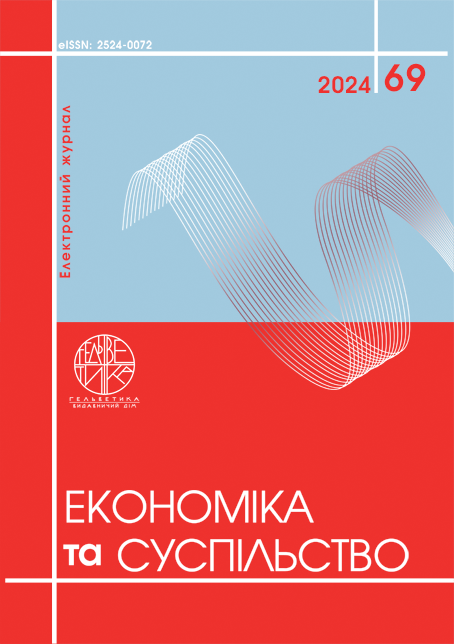COGNITIVE BIASES IN DECISION-MAKING REGARDING THE PURCHASE OF GOODS AND SERVICES: THE INVISIBLE FORCES IN THE MARKET
Abstract
This article explores the significance of the impact of cognitive biases on the decision-making mechanisms of consumers when purchasing goods and services in the market. The study examines how psychological and emotional factors influence human behavior and decision-making during purchases. The article identifies the main cognitive biases affecting purchasing behavior and analyzes their mechanisms of action. To achieve the research goal, a comprehensive approach was employed, incorporating various methods of data collection and analysis. Specifically, a content analysis of data collected during the study was conducted, which made it possible to identify key aspects of how cognitive biases influence individual purchasing decisions. The article presents a systematic and comprehensive discussion of results across several key aspects, including the identified cognitive biases, their influence on purchasing behavior, and practical recommendations for businesses, marketers, and consumers themselves. The study proposes a new approach to studying consumer behavior by integrating cognitive psychology theories with the principles of behavioral economics. The work details and classifies specific cognitive biases and heuristics, not only enriching existing knowledge in the field of behavioral economics but also opening new perspectives for further research in consumer psychology. The significance of the study is reflected in various aspects that can be useful for businesses, marketers, and individuals. Understanding cognitive biases and heuristics in practice can significantly enhance comprehension of consumer behavior, revealing trends that cannot be explained by classical economic theories. The practical value of the research lies in its ability to influence real business processes, improve consumer experience, and promote the development of market strategies based on a deep understanding of human behavior. Applying these insights can significantly increase the effectiveness of marketing campaigns and optimize client interactions. Furthermore, by recognizing cognitive biases, marketers can tailor their strategies to better resonate with consumers, leading to improved engagement and loyalty. The integration of these findings into business practices not only fosters a more effective marketing environment but also contributes to the overall understanding of consumer dynamics in an increasingly complex marketplace. Ultimately, this research underscores the critical role that cognitive biases play in shaping consumer behavior and highlights the necessity for ongoing exploration in this field.
References
Біхевіоризм. web.posibnyky.vntu.edu.ua. URL: https://web.posibnyky.vntu.edu.ua/icgn/8prishak_osnovy_psiholog_pedagogiki/r213.htm (дата звернення: 12.12.2024).
Мікловда В., Ходикіна І., Шевчук Я. Дослідження функціонування та прогнозування розвитку автотранспортної інфраструктури із застосуванням гібридних моделей. Науковий вісник Ужгородського університету. 2011. С. 6–9. URL: https://dspace.uzhnu.edu.ua/jspui/bitstream/lib/4579/1/ДОСЛІДЖЕННЯ%20ФУНКЦІОНУВАННЯ%20ТА%20ПРОГНОЗУВАННЯ%20РОЗВИТКУ.pdf (дата звернення: 12.12.2024).
Поведінкова та експериментальна економіка : опор. конспект лекцій. Тернопіль : ЗУНУ, 2016. 136 с. URL: http://dspace.wunu.edu.ua/retrieve/51563/2лекцій.pdf (дата звернення: 12.12.2024).
Якимова Н. Когнітивні упередження та їх вплив на поведінкові моделі суб’єктів ринку праці. Галицький економічний вісник. 2020. Т. 63, № 2. С. 118–125. URL: https://doi.org/10.33108/galicianvisnyk_tntu2020.02.118 (дата звернення: 12.12.2024).
Fox J. From «economic man» to behavioral economics. Harvard business review. URL: https://hbr.org/2015/05/from-economic-man-to-behavioral-economics (дата звернення: 12.12.2024).
Maxym Z. Евристика доступності (availability heuristic). Maxym Zosуm. URL: https://www.maxzosim.com/availability-heuristic/#:~:text=Евристика%20доступності%20(Availability%20Heuristic)%20-,видається%20та,%20яку%20легше%20пригадати (дата звернення: 12.12.2024).
Merton R. K. The self-fulfilling prophecy. The antioch review. 1948. Vol. 8, no. 2. P. 193. URL: https://doi.org/10.2307/4609267 (дата звернення: 12.12.2024).
www.wikidata.uk-ua.nina.az. Когнітивні спотворення. www.wikidata.uk-ua.nina.az. URL: https://www.wikidata.uk-ua.nina.az/Когнітивні_спотворення.html (дата звернення: 12.12.2024).
Xu E. The effect of anchoring on economic decision-making. Bcp business & management. 2022. Vol. 29. P. 92–98. URL: https://doi.org/10.54691/bcpbm.v29i.2191 (дата звернення: 12.12.2024).
Bikhevioryzm. (n.d.). web.posibnyky.vntu.edu.ua. https://web.posibnyky.vntu.edu.ua/icgn/8prishak_osnovy_psiholog_pedagogiki/r213.htm
Miklovda, V., Khodykina, Y., & Shevchuk, Y. (2011). Doslidzhennia funktsionuvannia ta prohnozuvannia rozvytku avtotransportnoi infrastruktury iz zastosuvanniam hibrydnykh modelei. Naukovyi visnyk Uzhhorodskoho universytetu, 6–9. https://dspace.uzhnu.edu.ua/jspui/bitstream/lib/4579/1/ДОСЛІДЖЕННЯ%20ФУНКЦІОНУВАННЯ%20ТА%20ПРОГНОЗУВАННЯ%20РОЗВИТКУ.pdf
Povedinkova ta eksperymentalna ekonomika. (2016). ZUNU. http://dspace.wunu.edu.ua/retrieve/51563/2лекцій.pdf
Yakymova, N. (2020). Kohnityvni uperedzhennia ta yikh vplyv na povedinkovi modeli subiektiv rynku pratsi. Halytskyi ekonomichnyi visnyk, 63(2), 118–125. https://doi.org/10.33108/galicianvisnyk_tntu2020.02.118
Fox, J. (2015, May 1). From «economic man» to behavioral economics. Harvard business review. https://hbr.org/2015/05/from-economic-man-to-behavioral-economics
Maxym, Z. (2023, May 9). Евристика доступності (availability heuristic). Maxym Zosуm. https://www.maxzosim.com/availability-heuristic/#:~:text=Евристика%20доступності%20(Availability%20Heuristic)%20-,видається%20та,%20яку%20легше%20пригадати
Merton, R. K. (1948). The self-fulfilling prophecy. The Antioch Review, 8(2), 193. https://doi.org/10.2307/4609267
www.wikidata.uk-ua.nina.az. (2024, July 17). Cognitive distortions. https://www.wikidata.uk-ua.nina.az/Когнітивні_спотворення.html
Xu, E. (2022). The effect of anchoring on economic decision-making. BCP Business & Management, 29, 92–98. https://doi.org/10.54691/bcpbm.v29i.2191

This work is licensed under a Creative Commons Attribution 4.0 International License.


